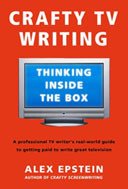 Spent a luxurious hour in the bath yesterday finishing Alex Epstein's new book, CRAFTY TV WRITING: Thinking Inside the Box. The tome is subtitled 'A professional TV writer's real-world guide to getting paid to write great television' and that's pretty accurate. As noted by UK scribe Lee Thomson on his blog The Light, It Hurts, large chunks of the text are simply not relevant to wannabe writers who live outside North America. Epstein's experiences and insights into cracking the US and Canadian TV writing market are fascinating to read, but not much use for people in other countries. Well, unless you plan on moving to Los Angeles or Toronto, you brave souls.
Spent a luxurious hour in the bath yesterday finishing Alex Epstein's new book, CRAFTY TV WRITING: Thinking Inside the Box. The tome is subtitled 'A professional TV writer's real-world guide to getting paid to write great television' and that's pretty accurate. As noted by UK scribe Lee Thomson on his blog The Light, It Hurts, large chunks of the text are simply not relevant to wannabe writers who live outside North America. Epstein's experiences and insights into cracking the US and Canadian TV writing market are fascinating to read, but not much use for people in other countries. Well, unless you plan on moving to Los Angeles or Toronto, you brave souls.But there is much about the book that's useful, it's all entertaining and Epstein writes with am ease and grace that makes the most complex concepts digestible. Rest assured, you're not simply buying one man's philosophy of screenwriting, as often happens with some tomes [particularly film writing books]. The author peppers his text with pertinent quotes from other industry professionals, agents and story editors and producers as well as many, many scribes.
There are two sections I'm going to pick out, for different reasons. In Moving Up the Food Chain, Epstein writes about how to run a writing room. Frankly, the advice he gives is applicable to almost anybody who has to manage other people - in a creative industry or otherwise. I'll keep this first extract down to the bullet points, in the interests of brevity. [If you don't work with writers, simply substitute the words staff for writers and task for script in what follows.]
• Always Start with Praise. If you can't praise the execution, praise the effort.
• Keep Responsibilities Clear. Make sure it's always clear who's working on which script.
• Keep Your Staff Working. Make sure everybody has something to work on.
• Try to Let Your Writers Do Their Work. Only take a script away from someone if he's really not going to be able to do the job in time.
• Work Toward the Long Term. Remember that show business is small, and how you treat people less powerful than you is how you'll be treated when you need a break later on.
• Pace Yourself. If you're so stressed that you're not having a life outside of work, you're probably working too many hours.
• Keep Up Discipline, but Don't Embarrass Anyone. Never tell off a writer [or anyone else for that matter] in front of other people.
• Don't Hog the Vision. Make sure everyone knows the vision you're trying to put on screen.
It's amazing how much of that is applicable to all the work environments I've ever been in, from washing dishes in a Latin American cafe to managing a hundred freelancers and a creative budget in excess of half a million pounds.
The other piece I wanted to extract is less profound, but I found it funny. Epstein is describing how TV writers often put what the characters are thinking into a script's action description, as a kind of shorthand. Here's the book's example:
JACK
Hey, I call the other night...
Oh, my God. He knows! Jill tries to cover:
JILL
Yeah, I accidentally kicked the plug out. I'm such a klutz.
Here's how Epstein follows that extract: Telling us what the character is thinking also puts the reader more into the character's point of view. The episode will read better. You have to be careful with this tool, though, and never use it for evil.
All in all, I recommend CRAFTY TV WRITING for all would-be TV scribes, but where you live will impact how useful the book is to you as a whole. It's published by Owl Books in the US and is available from Amazon.com. Apparently it'll reach the UK on August 10th, but you can pre-order it from Amazon.co.uk.
No comments:
Post a Comment